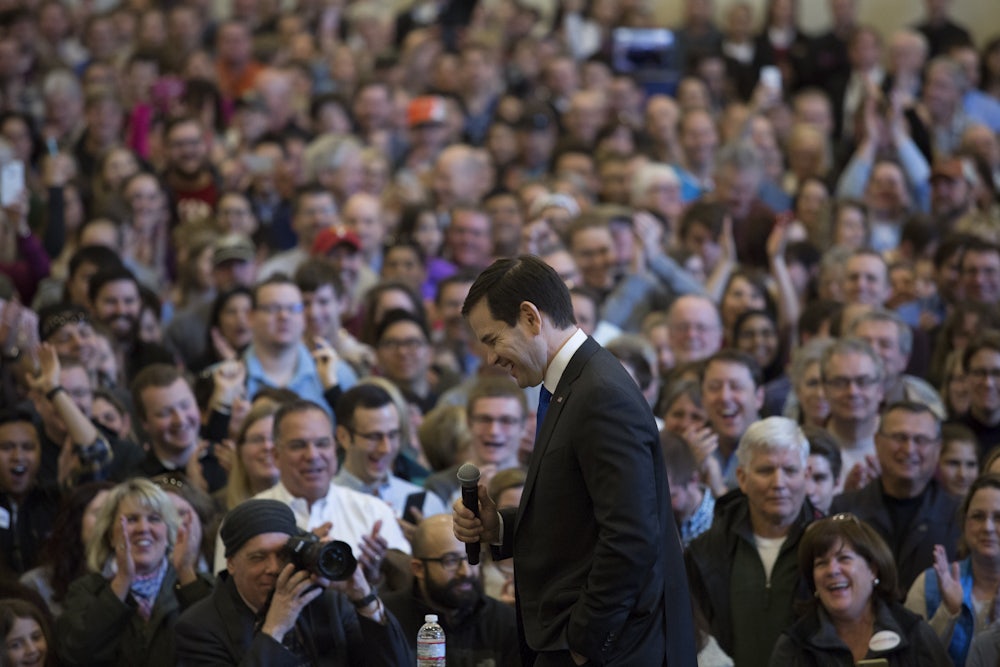For months, Marco Rubio had just one campaign office in Iowa, a small storefront in a strip mall in the Des Moines suburb of Ankeny. He spent so much time campaigning there that the other Republican candidates began to say that he was running for mayor. But his focus on Polk County, the nearly 600 square miles around Des Moines, paid off: Rubio bested both Trump and Cruz in the caucus there, propelling him to a surprisingly strong third place.
His strategy going into Super Tuesday, with its Southern-heavy slate of states, likewise hinges on areas like Ankeny—affluent, suburban neighborhoods where the Republicans are wealthy, white, and slightly more moderate. Rubio is unlikely to win a single state outright on Tuesday. But the mathematics could work in his favor. Super Tuesday states, unlike those that vote on March 15, are not winner-take-all. So Rubio can still accumulate delegates in states where he carries only a fraction of voters. That explains why Rubio is targeting the suburbs of Atlanta, Washington, D.C., and the Twin Cities. A strong performance in those areas may be enough for Rubio to leave Super Tuesday with a respectable delegate count going into the next round of primaries, in states where voters are friendlier to him.
Rubio was in Virginia on Sunday, campaigning just outside Washington in Loudoun, the richest county in the country. His campaign is also blanketing the airwaves in Virginia with a new ad that portrays him as the heir to Ronald Reagan. On Monday, in a final swing before Super Tuesday, Rubio goes to Knoxville, Tennessee; Tulsa, Oklahoma; and Lenox, Georgia.
These are all states where Rubio is unlikely to emerge victorious. Donald Trump is currently running 16 points ahead of Rubio in Georgia and 15 points ahead in Virginia, according to Real Clear Politics.
But Rubio is banking on support from the educated, affluent professionals who live in these suburban areas. “That’s Rubioland,” said Bill Galston, a former policy adviser to Bill Clinton. “He should hunt where his ducks are.” John Hudak, a senior fellow at the Brookings Institution, added: “Suburbs are full of people who were not left behind in the recession. They don’t have the same anger that Trump supporters have.” Rubio can appeal to those voters because he has peddled a slightly more optimistic message than the other Republican candidates.
Rubio is likely hoping suburbanites will be enough to give him a respectable trove of delegates on Super Tuesday. “Maximizing delegates is the name of the game on Super Tuesday,” Galston said. Barack Obama understood this in 2008. He racked up substantial delegate counts on Super Tuesday by targeting districts in states Hillary Clinton was sure to win. Rubio is doing much the same thing this year: Cruz and Trump are almost certain to carry the Southern states, but Rubio can offset their gains by pouring his resources into a few choice districts that are likely to swing for him. If the results play out like they have in previous contests, Nate Cohn estimates that Rubio collects 164 delegates come Tuesday, compared to Trump’s 279.
Some experts, however, caution against adopting that playbook. “It’s not a winning strategy,” Hudak said. “It’s a strategy that a losing candidate uses to make his candidacy last a few more weeks.” John Stamples, the vice president and publisher of the Cato Institute, was blunter: “If you finish 15 points down in Virginia, how can you make the argument that you’ll win the general election in the fall?” He continued, “He has to start winning some elections here. He has to show some strength against Trump.”
Still, the Florida senator is really good at manipulating the expectations game. He did it in Iowa, claiming victory with a third-place finish, and could do it again on Tuesday. Pundits have been predicting for months that Trump and Cruz would sweep the South. As long as Rubio gets a decent number of delegates, the press may see it as a victory.
That could carry Rubio forward to slightly friendlier states like Florida, Idaho, Kansas, Michigan, and Mississippi, which his super PAC began bombarding with new attack ads against Trump on Friday. The biggest question now is whether Rubio can make a strong enough case for himself after Super Tuesday to carry Florida and its 99 delegates. “Rubio can carry suburban areas on Tuesday, but if he doesn’t win Florida on March 15, it won’t matter,” said Geoffrey Skelley, a political analyst at the University of Virginia’s center for politics. “It’s hard to see how anyone would stop Trump.”
Rubio can also hope Trump wins Texas on Super Tuesday, embarrassing Cruz and forcing him from the race. Experts disagree on whether his exit would hurt or help the Florida senator: After all, some Cruz supporters could foreseeably go over to Trump, the other outsider in the race who has promised to take on the Washington cartel. Still, the risk might be worth it. Rubio needs a radical redistribution of support in this race to have any shot at the nomination. Cruz leaving would at least shake up the current map, and Rubio would also have the added benefit of being the sole leading candidate Trump’s opponents could rally around.
